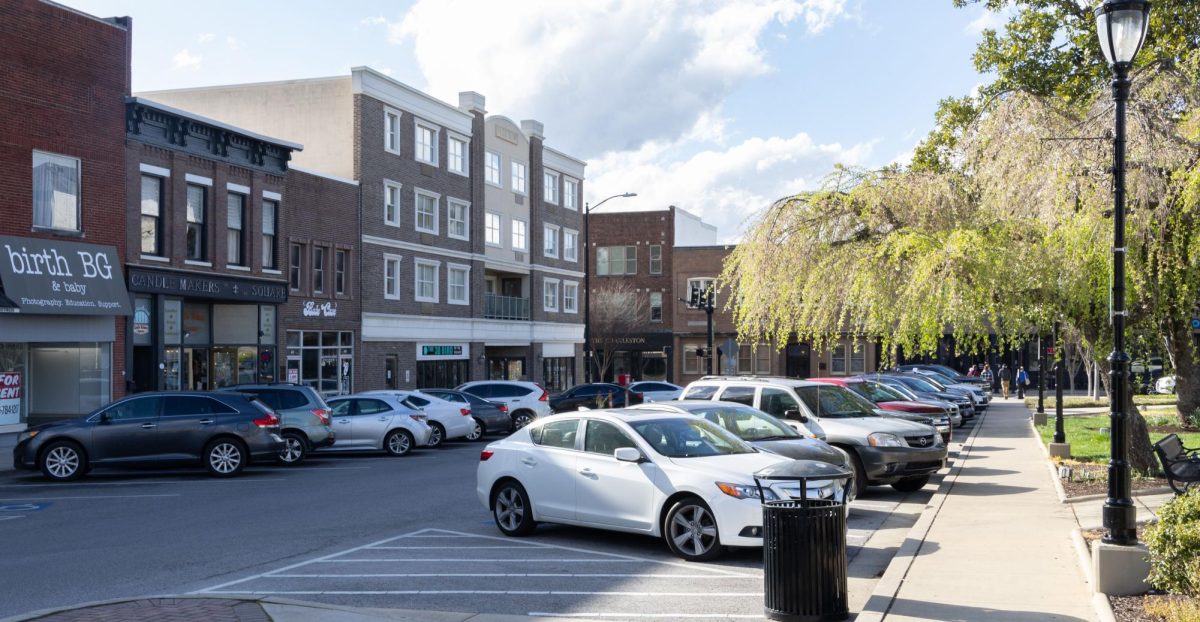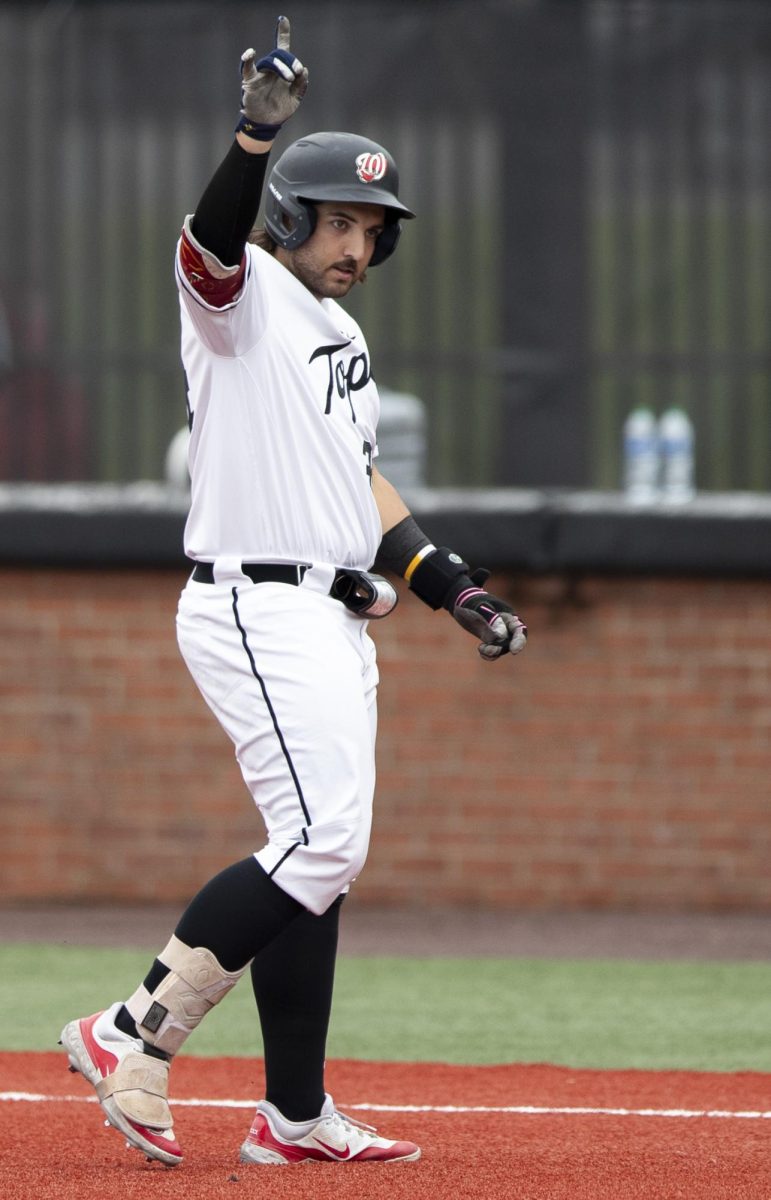Non-profit CEO encouraged WKU students to use skills to help others
April 19, 2012
Krochet Kids International CEO Kohl Crecelius spoke to WKU students and staff Wednesday night in front of about 35 students at Mass Media and Technology Hall on the importance of thinking sustainably.
Crecelius’s talk was a part of WKU’s week-long Earth Day celebration, sponsored by the Department of Sustainability, GreenToppers and the Center for Environmental Education and Sustainability.
Sustainability coordinator Christian Ryan-Downing welcomed guests and briefly explained why her department chose Crecelius as an Earth Day speaker.
“We wanted someone who is compassionate about people because our students are compassionate about people,” she said. “We wanted somebody who can come and inspire them with a message of hope.”
Crecelius’s company is a non-profit organization that teaches women in both Uganda and Peru how to crochet. Krochet Kids then takes the products made by the women, sells them across the world, and gives the profits back to the women who are a part of the company.
Although the company received non-profit status in 2008, Krochet Kids started when Crecelius taught two friends how to crochet after Crecelius’s older brother taught him, Crecelius said.
The three friends then sold their knit ware to friends and neighbors in their hometown of Spokane, Wash., where the local newspaper published their story and dubbed the trio “Krochet Kids.” Crecelius said the name just stuck from there.
“We caught crochet fever,” Crecelius said. “That’s how it started with that spirit and drive, that it’s fun to create and build a brand.”
Crecelius said that during his college years, he and his friends began traveling and volunteering abroad, all while “gaining a larger world perspective.”
“We got to understand the context and meet the people behind the statistics of poverty,” he said.
Crecelius’s travels led him and his friends to northern Uganda, a country that had forced its citizens to be “refugees within their own country,” Crecelius said.
“We asked them ‘What can we do to help?’” he said. “And they told us “We want to work.’”
Using what Crecelius called a “weird skill,” he and his friends developed a plan to provide a northern Ugandan community with sustainable income.
“We literally took army duffel bags…and stuffed them as full of yarn as any bag has ever been stuffed,” Crecelius said.
Starting in the summer of 2007, Crecelius and his friends taught 10 Ugandan women how to crochet.
“We started with a job,” he said. “From there, we just kept asking the question ‘What does it mean to help somebody?’”
In addition to providing a simple job, Crecelius said the group paired it with education and mentorship.
“Those three things make up our theory of change,” he said. “They can make up complete self-reliance.”
Today, Krochet Kids International has 150 women employed in Uganda and 20 in their newest site in Peru. The hats and other accessories made by the women can be found in major retailers such as Nordstrom, Crecelius said.
Each hat from Uganda and Peru comes with the name of the woman who crocheted the item. Customers can then write that woman a thank you note or a word of encouragement on the Krochet Kids website.
“It says to the ladies, ‘Hey, you’re really good at something. You have skills and you’ve helped me,’” Crecelius said. “That interaction is powerful.”
Crecelius encouraged the audience to redefine their concept of charity, asking them to dig deeper into the charities they support and see whether or not they “give a hand-out or a hands-up.” He also asked the audience to use whatever unique skills they have for the good of the community.
“What’s your crochet hook?” he asked.
When asked after the presentation, Crecelius said 85 percent to 90 percent of all profits go back to support the Krochet Kids international non-profit program.
“We give the women who work for us a [Ugandan] teacher’s salary,” he said. “We didn’t want to totally disrupt the system by paying a crocheter the same salary as a Ugandan doctor.”
He also said the profits cover material costs, outside support, education and training sessions, in addition to the wages the women make.
And what’s Crecelius’s favorite part of his job?
“I think it’s just to really help people realize their potential to create change, both the lady in a developing world…and the person in the US who is supporting our product,” he said.
Freshman Alyssa Born said she was encouraged by the presentation.
“I think what they’re doing for them over there is the coolest thing anyone could’ve thought of for that community,” she said.
Freshman Laura Harper said she agreed with the principle of the company, but still had her doubts.
“I kept thinking ‘Hmm…he’s a really good business man,’” she said. “I didn’t want to really take anything for face value, although it’s a great concept for helping people.”
When asked about the Earth Day festivities on the whole, Ryan-Downing said she’s been please with what’s happened so far.
“As always, I wish more people would come out and participate,” she said. “Friday is going to be great. My hopes are that the weather is perfect.”
The main event for Earth Day week is Friday from 11 a.m. to 4 p.m. in Centennial Mall. Ryan-Downing said there will be food, music and art, all celebrating a sustainable, eco-friendly environment.



















![Students cheer for Senator at Large Jaden Marshall after being announced as the Intercultural Student Engagement Center Senator for the 24th Senate on Wednesday, April 17 in the Senate Chamber in DSU. Ive done everything in my power, Ive said it 100 times, to be for the students, Marshall said. So, not only to win, but to hear that reaction for me by the other students is just something that shows people actually care about me [and] really support me.](https://wkuherald.com/wp-content/uploads/2024/04/jadenmarshall-600x422.jpg)




